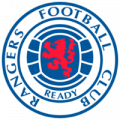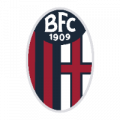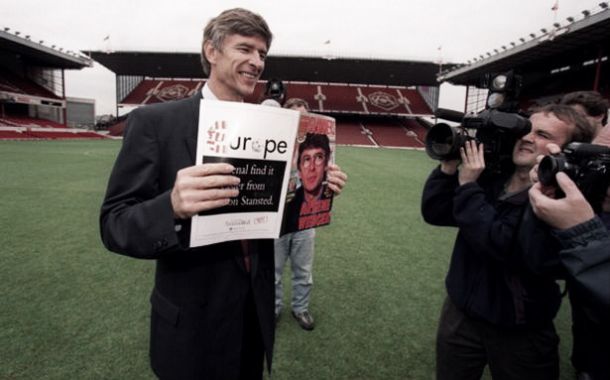October 1996 saw resurgence in Arsenal’s fortunes under new manager Arsene Wenger, although Dennis Bergkamp led the Gunners into the UEFA Cup the previous season, Wenger started to make people believe Arsenal could challenge for the league title again.
The signing of Patrick Vieira from AC Milan and outstanding form of Ian Wright had also helped start to switch Arsenal from a successful cup-side in the mid-90s to league challenger in 1996.
However, even with the boost under Wenger, one fixture would indicate whether Arsenal could really challenge or whether the Frenchman had more work to do: Manchester United at Old Trafford.
Despite a resilient performance, a Nigel Winterburn own goal settled the game for the hosts and proved the Gunners were still a few players short of overhauling the Red Devils’ Premier League dynasty.
In fact, it wouldn’t be until March 1998 where Arsenal would score their first Premier League goal and victory at Old Trafford thanks to 1997 summer signing Marc Overmars.
However, what happened to the Arsenal team of November 1996’s defeat to Manchester United?
Goalkeeper and back five
Although Wenger’s most successful early years were known for their 4-4-2, Arsenal in 1996-1997 played a 5-3-2.
It wasn’t quite known why as Arsenal hadn’t really employed it before or since, perhaps the lack of Overmars and Emmanuel Petit who wouldn’t sign until July 1997 meant Wenger felt Arsenal lacked width and physicality in the midfield.
Therefore, David Seaman and the usual back four were joined by Martin Keown to make up a back five with Lee Dixon and Nigel Winterburn as wingbacks.
Captain Tony Adams and current assistant manager Steve Bould completed arguably the most successful defensive unit in Gunners’ history, winning three league titles, two FA Cups and the UEFA Cup Winners’ Cup together between 1988 and 1998.
Adams and Dixon would retire from the club in 2002 following their second double; Keown would also retire a Gunner in 2004 following the unbeaten season.
Bould left Arsenal at the end of the 1998/1999 season with age against him, joining newly promoted Sunderland and being made club captain by Peter Reid – he led the Black Cats to seventh before retiring in 2000 due to arthritis.
He would return to the club shortly afterwards and helped bring through young players like Jack Wilshere, Henri Lansbury and Francis Coquelin who won the Youth League and Cup double in 2009, he succeeded Pat Rice as Wenger’s number two in 2012.
After losing his place to Sylvinho, Winterburn moved to West Ham United in 2000, he played 94 games for the Hammers before retiring in 2003.
David Seaman left the Gunners in 2003 after helping them to an FA Cup win thanks to one of the greatest saves ever in the semi-final against Sheffield United where he clawed Paul Peschisolido’s header off the line.
He retired in January 2004 due to injury whilst at Manchester City.
Midfield trio
Arsenal’s midfield three for the game at Old Trafford was Patrick Vieira, David Platt and Paul Merson – only one would have a prolonged Arsenal career under Wenger.
Vieira would of course go on to become an Arsenal legend, winning three league titles, captaining the team to a season unbeaten and cementing his legacy with the winning penalty in the 2005 FA Cup final.
Afterwards, he returned to Italy with Juventus but after one season and the Calciopoli scandal that stripped the Old Lady of their two Scuddetto titles and relegation to Serie B, he left to join Inter Milan.
After four years at Inter, he returned to England with Manchester City where he remains today as a youth coach.
David Platt’s role in the team would slowly reduce under Wenger but he did come up trumps against Manchester United the following season scoring the winner with a sensational late header at Highbury in a great 3-2 victory.
He left the Reds in 1998 to study coaching but had a spell as player-manager at Nottingham Forest between 1999 and 2001.
Platt has since been England Under 21 manager and was part of Manchester City’s 2012 league winning coaching staff, he is currently head coach of FC Pune City in the Indian Super League.
Paul Merson was another Arsenal legend but during the mid-90s had many off-field problems involving, drink, drugs and gambling.
Although Merson rehabilitated, he left Arsenal at the end of the 1996-1997 season for Middlesborough in Division One, he would later play for Aston Villa, Portsmouth, Walsall (where he was player manager) and several non-league teams. Merson is currently a pundit for Sky Sports.
The front two
The front two were Arsenal legends Dennis Bergkamp and Ian Wright who in their brief few years together struck up a great rapport, much to the delight of Arsenal fans.
Bergkamp would of course go onto score over 100 goals for the club and be a key part of the three title winning teams as the ‘Quarterback’ of the team before retiring in 2006.
Ian Wright finally got his much deserved league winners medal in 1998 and during that season set the all-time Arsenal goal scoring record (185) that was eventually broken by Thierry Henry in 2006.
Wright left for West Ham United in 1998 due to the emergence of Nicholas Anelka, he spent short spells at Nottingham Forest, Celtic and Burnley afterwards before retiring in 2000, he is now a TV pundit for several different UK outlets.










































